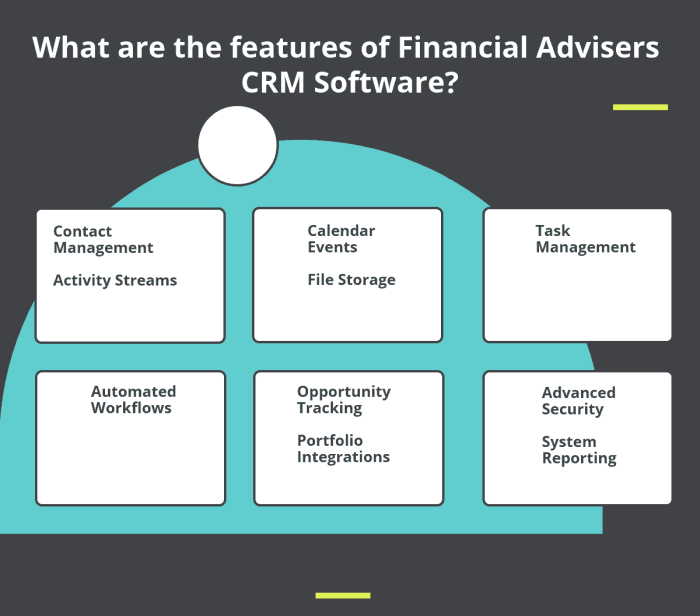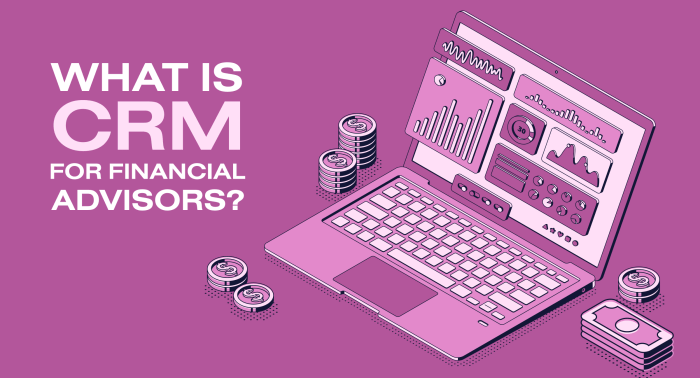Crm software for financial advisors – In today’s competitive financial landscape, efficiently managing client relationships is paramount for success. This is where Customer Relationship Management (CRM) software steps in, offering financial advisors a powerful tool to streamline operations, enhance client engagement, and ultimately, boost profitability. This comprehensive guide delves into the world of CRM software specifically designed for the needs of financial advisors, exploring its features, benefits, and considerations for implementation.

Source: altastreet.com
Understanding the Needs of Financial Advisors
Financial advisors face unique challenges requiring specialized CRM solutions. They need software that not only manages contacts and communications but also integrates seamlessly with their existing financial planning tools, complies with stringent regulatory requirements, and provides robust security features to protect sensitive client data. Key considerations include:
- Client Portfolio Management: Tracking assets, liabilities, investment strategies, and performance.
- Regulatory Compliance: Meeting requirements like KYC (Know Your Customer), AML (Anti-Money Laundering), and GDPR (General Data Protection Regulation).
- Secure Data Storage: Protecting sensitive client information with encryption and access controls.
- Workflow Automation: Automating tasks like appointment scheduling, follow-ups, and report generation.
- Reporting and Analytics: Generating insightful reports on client activity, performance, and overall business trends.
- Integration with other financial tools: Seamless connection with portfolio management software, accounting systems, and other relevant applications.
Key Features of CRM Software for Financial Advisors
A robust CRM for financial advisors should offer a comprehensive suite of features designed to address their specific needs. These include:
Client Management
- Centralized Client Database: A single, easily accessible repository for all client information, including contact details, financial profiles, and communication history.
- Client Segmentation: Grouping clients based on shared characteristics (e.g., net worth, investment goals) for targeted marketing and communication.
- Contact Management: Managing interactions through various channels (email, phone, SMS) and maintaining a complete history of communication.
- Document Management: Secure storage and retrieval of client documents, such as agreements, financial statements, and tax returns.
Financial Planning Integration, Crm software for financial advisors
- Portfolio Tracking: Monitoring client portfolios in real-time, providing up-to-date insights into asset allocation and performance.
- Financial Goal Setting: Assisting clients in setting and tracking financial goals, such as retirement planning or college savings.
- Performance Reporting: Generating customized reports on client portfolio performance, fees, and overall financial health.
Workflow Automation and Task Management
- Automated Reminders and Follow-ups: Sending automated reminders for appointments, birthdays, and other important events.
- Appointment Scheduling: Streamlining appointment scheduling with integrated calendar functionality.
- Task Management: Assigning and tracking tasks related to client management, financial planning, and administrative duties.
Reporting and Analytics
- Customizable Dashboards: Providing a clear overview of key performance indicators (KPIs) and client activity.
- Client Segmentation Reporting: Analyzing client behavior and identifying opportunities for growth.
- Performance Tracking: Monitoring the effectiveness of marketing campaigns and client engagement strategies.
Choosing the Right CRM Software
Selecting the appropriate CRM software requires careful consideration of several factors:

Source: soloway.tech
- Scalability: Ensure the software can accommodate your current and future needs as your business grows.
- Integration Capabilities: Verify seamless integration with your existing financial planning tools and other applications.
- Security and Compliance: Confirm the software meets industry security standards and regulatory requirements.
- User-Friendliness: Choose software with an intuitive interface that is easy for both you and your team to use.
- Cost and Pricing: Evaluate the software’s pricing model and ensure it aligns with your budget.
- Customer Support: Assess the quality and responsiveness of the vendor’s customer support.
Popular CRM Software Options for Financial Advisors
Several CRM platforms cater specifically to the needs of financial advisors. Research and compare options based on your specific requirements and budget. Examples include (but are not limited to):
- Redtail CRM: A popular choice known for its robust features and integration capabilities.
- Wealthbox: A user-friendly option with a strong focus on client communication and relationship management.
- Salesforce Financial Services Cloud: A comprehensive platform offering advanced features for larger firms.
- Junxure: A highly customizable solution often favored by high-net-worth advisors.
Implementing CRM Software: A Step-by-Step Guide
Successfully implementing CRM software requires a structured approach:
- Needs Assessment: Define your specific requirements and objectives for the CRM system.
- Software Selection: Research and compare different CRM options, selecting the one that best meets your needs.
- Data Migration: Transfer your existing client data into the new CRM system accurately and efficiently.
- Training and Onboarding: Provide thorough training to your team on how to use the new software effectively.
- Integration and Customization: Integrate the CRM with your existing financial planning tools and customize it to your specific workflows.
- Monitoring and Optimization: Continuously monitor the performance of the CRM system and make adjustments as needed.
Frequently Asked Questions (FAQ)
- Q: What is the cost of CRM software for financial advisors? A: Costs vary widely depending on the features, scalability, and vendor. Expect a range from monthly subscription fees to more substantial upfront investments for enterprise-level solutions.
- Q: How long does it take to implement a CRM system? A: Implementation time varies depending on the complexity of the system and the size of your firm. It can range from a few weeks to several months.
- Q: What are the benefits of using CRM software for financial advisors? A: Benefits include improved client relationships, increased efficiency, enhanced compliance, better data management, and ultimately, increased profitability.
- Q: Is CRM software secure? A: Reputable CRM providers prioritize security and compliance with industry standards. Look for features like data encryption, access controls, and regular security audits.
- Q: Can CRM software integrate with my existing financial planning tools? A: Many CRM platforms offer integration capabilities with popular financial planning software. Verify compatibility before selecting a system.
Conclusion
Implementing a CRM system is a strategic investment that can significantly enhance the efficiency and profitability of your financial advisory practice. By carefully considering your needs, researching available options, and following a structured implementation plan, you can leverage the power of CRM software to strengthen client relationships, improve operational efficiency, and drive sustainable growth.
References: Crm Software For Financial Advisors
Call to Action
Ready to elevate your financial advisory practice? Explore the CRM options mentioned above and contact a vendor today for a personalized consultation. Start maximizing your efficiency and client relationships!
Common Queries
What are the key features to look for in CRM software for financial advisors?
Key features include client relationship management, contact management, lead tracking, task automation, reporting and analytics, and integration with other financial tools.
How much does CRM software for financial advisors typically cost?
Pricing varies widely depending on the features, scalability, and vendor. Expect a range from affordable monthly subscriptions to more substantial upfront investments for enterprise-level solutions.
What is the best way to implement CRM software in a financial advisory firm?
Successful implementation involves careful planning, staff training, data migration, and ongoing support. Consider starting with a pilot program and gradually expanding to ensure a smooth transition.
How can CRM software help improve client retention?

Source: com.au
By providing tools for personalized communication, automated follow-ups, and efficient service, CRM software helps maintain strong client relationships, reducing churn and increasing loyalty.
